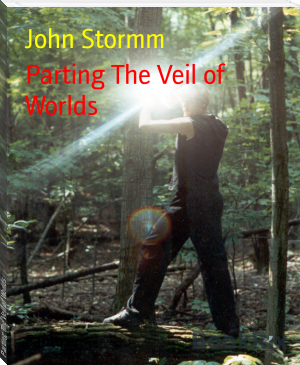The Well at the World's End: A Tale, William Morris [rainbow fish read aloud TXT] 📗

- Author: William Morris
Book online «The Well at the World's End: A Tale, William Morris [rainbow fish read aloud TXT] 📗». Author William Morris
Then the voice ceased, but still the image stood before him awhile, and he wondered if she would speak again, and tell him aught of the way to the Well at the World's End; and she spake again: "Nay," she said, "I cannot, since we may not tread the way together hand in hand; and this is part of the loss that thou hast had of me; and oh! but it is hard and hard." And her face became sad and distressful, and she turned and departed as she had come.
Then he knew not if he awoke, or if it were a change in his dream; but the chamber became dark about him, and he lay there thinking of her, till, as it seemed, day began to dawn, and there was some little stir in the world without, and the new wind moved the casement. And again the door opened, and someone entered as before; and this also was a woman: green-clad she was and barefoot, yet he knew at once that it was not his love that was dead, but the damsel of the ale-house of Bourton, whom he had last seen by the wantways of the Wood Perilous, and he thought her wondrous fair, fairer than he had deemed. And the word came from her: "I am a sending of the woman whom thou hast loved, and I should not have been here save she had sent me." Then the words ended, while he looked at her and wondered if she also had died on the way to the Well at the World's End. And it came into his mind that he had never known her name upon the earth. Then again came the word: "So it is that I am not dead but alive in the world, though I am far away from this land; and it is good that thou shouldst go seek the Well at the World's End not all alone: and the seeker may find me: and whereas thou wouldst know my name, I hight Dorothea."
So fell the words again: and this image stood awhile as the other had done, and as the other had done, departed, and once more the chamber became dark, so that Ralph could not so much as see where was the window, and he knew no more till he woke in the early morn, and there was stir in the street and the voice of men, and the scent of fresh herbs and worts, and fruits; for it was market-day, and the country folk were early afoot, that they might array their wares timely in the market-place.
CHAPTER 16 Of the Tales of Swevenham
Old Richard was no worse than his word, and failed not to find old acquaintance of Swevenham in the Saturday's market: and Ralph saw naught of him till midweek afterwards. And he was sitting in the chamber of the hostel when Richard came in to him. Forsooth Blaise had bidden him come dwell in his fair house, but Ralph would not, deeming that he might be hindered in his quest and be less free to go whereso he would, if he were dwelling with one who was so great with the magnates as was Blaise.
Now Ralph was reading in a book when Richard came in, but he stood up and greeted him; and Richard said smiling: "What have ye found in the book, lord?" Said Ralph: "It telleth of the deeds of Alexander." "Is there aught concerning the Well at the World's End therein?" said Richard. "I have not found aught thereof as yet," said Ralph; "but the book tells concerning the Dry Tree, and of kings sitting in their chairs in the mountains nearby."
"Well then," said Richard, "maybe thou wilt think me the better tale-teller." "Tell on then," quoth Richard. So they went and sat them down in a window, and Richard said:
"When I came to Swevenham with two old men that I had known young, the folk made much of me, and made me good cheer, whereof were over long to tell thee; but to speak shortly, I drew the talk round to the matter that we would wot of: for we spake of the Men of the Dry Tree, and an old man began to say, as master Clement the other day, that this name of theirs was but a token and an armoury which those champions have taken from the Tree itself, which Alexander the Champion saw in his wayfarings; and he said that this tree was on the hither side of the mountains called the Wall of the World, and no great way from the last of the towns whereto Clement will wend; for Clement told me the name thereof, to wit, Goldburg. Then another and an older man, one that I remember a stout carle ere I left Swevenham, said that this was not so, but that the Tree was on the further side of the Wall of the World, and that he who could lay his hand on the bole thereof was like enough to drink of the Well at the World's End. Thereafter another spake, and told a tale of how the champions at Hampton first took the Dry Tree for a token; and he said that the rumour ran, that a woman had brought the tidings thereof to those valiant men, and had fixed the name upon them, though wherefore none knew. So the talk went on.
"But there was a carline sitting in the ingle, and she knew me and I her. And indeed in days past, when I was restless and longing to depart, she might have held me at Swevenham, for she was one of the friends that I loved there: a word and a kiss had done it, or maybe the kiss without the word: but if I had the word, I had not the kiss of her. Well, when the talk began to fall, she spake and said to me:
"'Now it is somewhat strange that the talk must needs fall on this seeking of that which shall not be found, whereas it was but the month before thou wert last at Swevenham, that Wat Miller and Simon Bowyer set off to seek the Well at the World's End, and took with them Alice of Queenhough, whom Simon loved as well as might be, and Wat somewhat more than well. Mindest thou not? There are more than I alive that remember it.'
"'Yea,' said I, 'I remember it well.'
"For indeed, foster-son, these were the very three of whom I told thee, though I told thee not their names.
"'Well,' said I; 'how sped they? Came they back, or any of them?' 'Nay,' she said, 'that were scarce to be looked for.' Said I: 'Have any other to thy knowledge gone on this said quest?'
"'Yea,' she said, 'I will tell thee all about it, and then there will be an end of the story, for none knoweth better thereof than I. First there was that old man, the wizard, to whom folk from Swevenham and other places about were used to seek for his lore in hidden matters; and some months after those three had departed, folk who went to his abode amongst the mountains found him not; and soon the word was about that he also, for as feeble as he was, had gone to seek the Well at the World's End; though may-happen it was not so. Then the next spring after thy departure, Richard, comes home Arnold Wright from the wars, and asks after Alice; and when he heard what had befallen, he takes a scrip with a little meat for the road, lays his spear on his shoulder, and is gone seeking the lost, and the thing which they found not—that, I deem, was the end of him. Again the year after that, as I deem, three of our carles fell in with two knights riding east from Whitwall, and were questioned of them concerning the road to the said Well, and doubted not but that they were on that quest. Furthermore (and some of you wot this well enough, and more belike know it not) two of our young men were faring by night and cloud on some errand, good or bad, it matters not, on the highway thirty miles east of Whitwall: it was after harvest, and the stubble-fields lay on either side of the way, and the moon was behind thin clouds, so that it was light on the way, as they told me; and they saw a woman wending before them afoot, and as they came up with her, the moon ran out, and they saw that the woman was fair, and that about her neck was a chaplet of gems that shone in the moon, and they had a longing both for the jewel and the woman: but before they laid hand on her they asked her of whence and whither, and she said: From ruin and wrack to the Well at the World's End, and therewith turned on them with a naked sword in her hand; so that they shrank from before her.
"'Hearken once more: the next year came a knight to Swevenham, and guested in this same house, and he sat just where sitteth now yon yellow-headed swain, and the talk went on the same road as it hath gone to-night; and I told him all the tale as I have said it e'en now; and he asked many questions, but most of the Lady with the pair of beads. And on the morrow he departed and we saw him not again.
"Then she was silent, but the young man at whom she had pointed blushed red and stared at her wide-eyed, but said no word. But I spake: 'Well dame, but have none else gone from Swevenham, or what hath befallen them?'
"She said: 'Hearken yet! Twenty years agone a great sickness lay heavy upon us and the folk of Whitwall, and when it was at its worst, five of our young men, calling to mind all the tales concerning the Well at the World's End, went their ways to seek it, and swore that back would they never, save they found it and could bear its water to the folk of Swevenham; and I suppose they kept their oath; for we saw naught either of the water or of them. Well, I deem that this is the last that I have to tell thee, Richard, concerning this matter: and now is come the time for thee to tell tales of thyself.'
"Thus for that time dropped the talk of the Well at the World's End, Lord Ralph, and of the way thither. But I hung about the township yet a while, and yesterday as I stood on their stone bridge, and looked on the water, up comes that long lad with the yellow hair that the dame had pointed at, and says to me: 'Master Richard, saving thine age and thy dignity and mastery, I can join an end to the





Comments (0)